Plot summary
While recovering from his addictions, Paracha spent time rearranging these notes using the cut-up method and surrealist automatism.
He then turned it all into a work of fiction in which a heroin addict narrates his story set in future Pakistan and India that have turned into capitalist and theistic dystopias.
He is a traveler who is always moving up and down both the countries looking for drugs and in the process having hallucinatory dialogues with a Pakistani cleric/Islamic extremist (called in the book as "The Mufti"), a group of Hindu fundamentalists (called "The pundits"), a group of young neoliberals (referred to as "the fun young people" and the "polite voids"), and an aging Indian Christian (called the "Holy Father").
There are also many other characters, but much of the story revolves around these main characters as Paracha constructs his dystopia in which capitalism and organized religion have been fused together as a new totalitarian system.
Acidity makes a clear comment this way on the rapid economic, political and social changes taking place in India and Pakistan, especially after the end of the Cold War.
Cyberpunk is a subgenre of science fiction in a dystopian futuristic setting that tends to focus on a "combination of low-life and high tech" featuring advanced technological and scientific achievements, such as artificial intelligence and cybernetics, juxtaposed with a degree of breakdown or radical change in the social order. Much of cyberpunk is rooted in the New Wave science fiction movement of the 1960s and 1970s, when writers like Philip K. Dick, Roger Zelazny, John Brunner, J. G. Ballard, Philip José Farmer and Harlan Ellison examined the impact of drug culture, technology, and the sexual revolution while avoiding the utopian tendencies of earlier science fiction.
Utopian and dystopian fiction are genres of speculative fiction that explore social and political structures. Utopian fiction portrays a setting that agrees with the author's ethos, having various attributes of another reality intended to appeal to readers. Dystopian fiction offers the opposite: the portrayal of a setting that completely disagrees with the author's ethos. Some novels combine both genres, often as a metaphor for the different directions humanity can take depending on its choices, ending up with one of two possible futures. Both utopias and dystopias are commonly found in science fiction and other types of speculative fiction, and are themselves arguably, by definition, a type of speculative fiction.
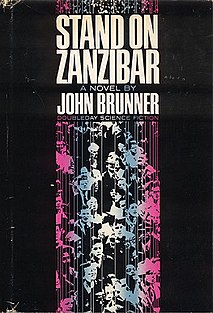
Stand on Zanzibar is a dystopian New Wave science fiction novel written by John Brunner and first published in 1968. The book won a Hugo Award for Best Novel at the 27th World Science Fiction Convention in 1969, as well as the 1969 BSFA Award and the 1973 Prix Tour-Apollo Award.

The Iron Heel is a dystopian novel by American writer Jack London, first published in 1908.
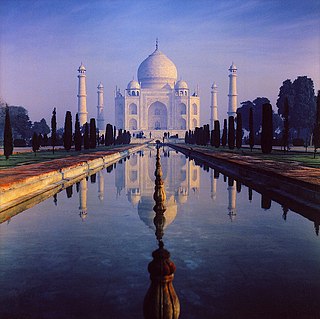
Urdu literature is literature in the Urdu language. While it tends to be dominated by poetry, especially the verse forms of the ghazal غزل and nazm نظم, it has expanded into other styles of writing, including that of the short story, or afsana افسانہ. Urdu literature is mostly popular in Pakistan, where Urdu is the national language and India, where it is a recognized language. It is also widely understood in Afghanistan and has moderate amount of popularity in Bangladesh.
Bina Shah is a Pakistani writer, columnist and blogger living in Karachi.
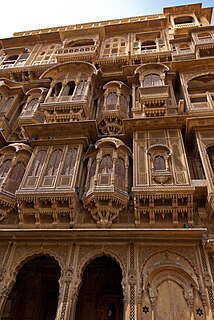
A haveli is a traditional townhouse or mansion in the Indian subcontinent, usually one with historical and architectural significance. The word haveli is derived from Arabic hawali, meaning "partition" or "private space", popularised under the Mughal Empire, and was devoid of any architectural affiliations. Later, the word haveli came to be used as a generic term for various styles of regional mansions, townhouse and temples found in the Indian subcontinent.
Chowk.com was a website with a focus on the current affairs, politics and cultural aspects of India and Pakistan. Its stated goal is to provoke readers go beyond soundbites and uncover the truth, however uncomfortable. It was also a magazine that aimed to promote discourse between people of the subcontinent on various issues which affected their lives. The site appeared to become stale in March 2012.
Samit Basu is an Indian novelist and filmmaker whose body of work includes fantasy and superhero novels, children's books, graphic novels and short stories, and a film, House Arrest. His next announced work is an anti-dystopian novel, Chosen Spirits, was released in ebook form on April 2020.
The partition of India and the associated bloody riots inspired many creative minds in India and Pakistan to create literary/cinematic depictions of this event. While some creations depicted the massacres during the refugee migration, others concentrated on the aftermath of the partition in terms of difficulties faced by the refugees in both side of the border. Even now, more than 60 years after the partition, works of fiction and films are made that relate to the events of partition.
Music '89 was the first ever all pop music stage-show to be aired on Pakistan TV.

A dystopia is a community or society that is undesirable or frightening. It is an antonym of utopia, a term that was coined by Sir Thomas More and figures as the title of his best known work, published in 1516, which created a blueprint for an ideal society with minimal crime, violence and poverty.
Khursheed Kamal Aziz better known as K. K. Aziz, was a Pakistani historian, admired for his books written in the English Language. However, he also wrote Urdu prose and was a staunch believer in the importance of the Persian language to enhance one's knowledge about the world.
Sant Singh Sekhon (1908–1997) was an Indian playwright and fiction writer associated with Punjabi literature. He is part of the generation of Indian authors who mark the transition of India into an independent nation, scarred by the tragedies of partition.
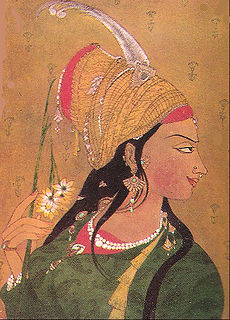
Syed Imtiaz Ali Taj was a dramatist who wrote in the Urdu language. He is remembered above all for his 1922 play Anarkali, based on the life of Anarkali, that was staged hundreds of times and was adapted for feature films in India and Pakistan, including the Indian film Mughal-e-Azam (1960).

Cat Country is a dystopian satirical novel by Chinese writer Lao She (1899–1966). It has been translated into English, French, German, Hungarian, Japanese and Russian.
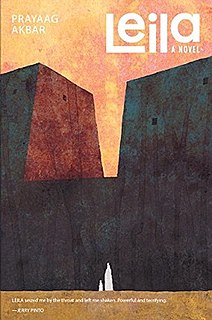
Leila is a 2017 Indian dystopian novel written by journalist Prayaag Akbar. Set in the 2040s, the story follows Shalini, who tries to find her missing daughter Leila, in a totalitarian regime. It was published by Simon & Schuster in several formats on 20 April 2017 and received a positive critical response.







